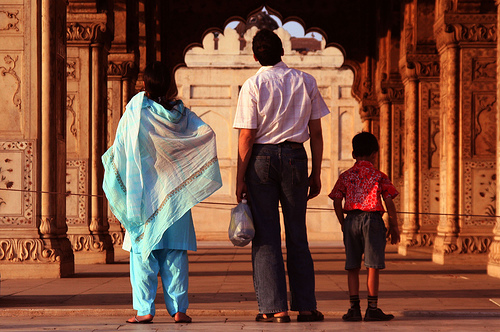
“Hinduism is a way of life, not a religion.”
You will hear this phrase over and over as you learn about Hinduism. It is a very true statement, but what does “way of life” mean? Why does Hinduism get to claim to be outside of “religion”? What makes it so different?
It really comes down to one word. One untranslatable word that most Hindus don’t regularly talk about, but creates the entire structure for their life and society.
The most important term you’ve never heard
Dharma comes from the root word dhr that can be translated as “uphold” or “sustain”, according to Indologist PV Kane (quoted in Dayanand Bharati’s Understanding Hinduism). In many ways, the concepts of dharma have been the “supports” for Hindu (and Indian) society for a long time.
Hindu, Buddhist, and Jain traditions all give a central place to dharma, with some varying shades of meaning and emphasis. Buddhists define dharma as “cosmic law and order”, or the general teachings of the Buddha. Jains define it as the teachings of the Jinas. Sikhs also use dharm to mean the “path of righteousness”. Even Muslim and Christian communities adopt some of the ideas behind dharma in their community life.
Despite its pervasiveness, dharma is not a term you often hear in conversation. It is akin to the water the fish swims in. It is the accepted way things are supposed to work in the world. Because it is so foundational to the Hindu worldview, the differences between dharma and Western ideas create a huge divide in being able to understand each other.
Dharma doesn’t translate well
Dharma is not possible to translate directly into English, not just because we don’t have an equivalent word. We don’t even have an equivalent concept.
Some phrases that are regularly used are duty, conduct, right action, right living, social order, obligation, and culture.
The best way I find to understand dharma is to think back to the three components of religion – beliefs, behaviors, and community. Dharma is the relationship between how your personal behaviors impact the community you are a part of. (Remember that community and behaviors are much more important to a Hindu than beliefs.)
So, when a man works 12 hour days to provide the best life for his family, he is practicing dharma. When parents go through hundreds of profiles to find the right match for their children, they are practicing dharma. When a daughter-in-law cares for her husband’s ageing parents, she is practicing dharma.
While slightly similar, you shouldn’t confuse dharma with the western concept of “civic duty”. Civic duty says individuals who are part of a country/state/town should practice behaviors that are best for the larger society. After that, you can do what is best for your smaller family.
Dharma reverses this hierarchy. It says the right action is what is best for your very tightly connected immediate community (think extended family). After that, you can also do what is best for the society at large.
Dharma is an individual situational code of ethics, not universal
Perhaps the biggest difference between dharma and western concepts is that dharma is different from person to person. It is affected by your stage of life, the community you come from, and who else is involved. Dharma can be different for different people, but also it can be different for one person depending on what stage of life he or she is in.
The classical example is Arjuna in the Bhagavad Gita. Arjuna comes from a caste of warriors. However, as he prepares for a great battle, he desires not to fight because those on the other side are close family members he does not wish to kill. Arjuna is exhorted by Krishna to fight not simply because “it’s the right thing to do”, but because he comes from a warrior caste. This is his duty; therefore, he must not abandon it. Had he not been from the warrior caste, he would be under no obligation to fight.
For a modern example, I knew a middle-aged woman from a well-off family that was heavily into spiritual thinking and reading. She was constantly reading books and attending seminars. Her family did not strongly support her efforts, not because they thought it was wrong, but because given her stage of life, she should be spending this time focused on raising her children. They wished she would leave these spiritual things for when she was older and her children were married.
There are no universal 10 Commandments of Hinduism. What is right for you may not be right for me. The Gita says that it is better to do your own duty poorly than to do someone else’s duty well (3:35). Individuals in a society have specific roles to play, and society depends on them to perform their roles well.
Dharma is subtle
This line comes from Gurcharan Das’ book, The Difficulty of Being Good. He uses this refrain to bring attention to the fact that in a culture that rejects universalism, the lines of what exactly is right are hazy. Because so many factors play a role in determining “right action”, it is impossible to always have a clear answer.
Here is a hierarchy of three questions that Hindus will often use to determine what is “right” in a given situation.
- What will be the impact on my personal relationships (especially those in my inner circle)?
- What are the financial costs of taking each action?
- What are the universal laws that govern these actions?
Given the subtlety of dharma, an action that seems unethical from a universalist perspective can be justified. For example, let’s say Prasad’s uncle comes to him and says he is in a very bad legal position. He needs Prasad to sign an official document for him that might be considered “lying” to some. Here, dharma is subtle, but it leans toward doing what is best for the community, which is keeping Uncle out of trouble. #Greyiswhite
Adharma is serious
Adharma means anything against dharma.
Dayanand Bharati is quick to point out that adharma should not be equated with sin. To put it simply, sin is a personal action you have done that puts you in bad standing with God (or the gods). This is usually a moral or spiritual failure.
Adharma is different in that it does not have to be moral/spiritual. It might be extremely practical. The key difference is that the impact of adharma is not on your personal spiritual integrity, but on the community as a whole.
One example in the modern world relates to joint families. In traditional areas, if an unmarried child moves out of his parent’s home to another place in the same city, this is a cause of shame for the family. There is nothing ethically wrong with this action, but it would be considered adharma because it puts the family in a very bad light. People will think, “What is wrong? Why did he move out? What kind of animosity must be there?”
For this reason, adharma is usually considered more serious than sin. PV Kane says, “Dharma upholds the order, adharma threatens it.”
How to apply the lessons of dharma as an outsider
Hopefully you can see the differences between dharma and your worldview. Because we are talking at such a fundamental level, even a small difference can create huge gaps in the practical world. Here are some tips for how you can apply your knowledge of dharma to your Hindu friends and colleagues.
- Just because you know about it doesn’t mean dharma should be a small talk topic in conversation. Let it impact your interactions without bringing it up specifically.
- Resist the urge to interpret someone’s actions in a clear-cut black and white sense. Instead of immediately dismissing something as unethical, take a guess as to “why” they did it, given the role of dharma. If you are having trouble coming up with an answer, ask an Indian.
- Be careful giving advice on family matters. Don’t immediately respond if a young Hindu asks you for your opinion on if he should agree to an arranged marriage. Resist giving quick approval to the young girl who asks if you think she should move out on her own. These are family issues and are incredibly more complex than you realize. You can ask intelligent questions, but don’t give advice.
Understanding dharma is foundational for understanding how Hindus act in the world. Despite the fact that you may never hear anyone talk about it, dharma is an ancient idea that continues to influence the majority of decisions in India.
Don’t forget to sign up to get more articles on India delivered to your inbox!
Image credit: Wen-Yan King on Flickr





Great article – thanks. In Buddhism I know that in informal language the word “Dharma” is also used as embracing the whole of the teachings. So, for example, we study Dharma.
Good insight! I don’t know much about Buddhism, but I know this is an important term for them too!
Excellent Neil. You have written very well about a tricky aspect of our culture. This, in my opinion, comes from centuries of growing inside-out rather than outside-in like some of the other cultures.
The aspect of Dharma that you talk about – where one acts more in line with inner circle than an absolute yardstick of right or wrong – creates the corruption perception (and reality) that is so prevalent in India today. You will find good, well-intentioned folk think nothing of what would be legally an illegal act, because of the immediate benefits it creates. And is an aspect that hasn’t been dealt with well as we transition to a more modern society.
Awesome point, Aravind. I would wager that at least half of what we in the west describe as “corruption” is, at its root, a case of doing what is best for one’s inner circle. The fact that different cultures define what is right and wrong with different definitions sets us up for some serious clashes and misunderstandings!
Jain Vaani is a platform where you know about Jain Religion (Dharma). Online Jain Radio gives you many Jain Bhajan, Jain Music, Jain Tirth & Temples in India.
Source: Jain Dharma